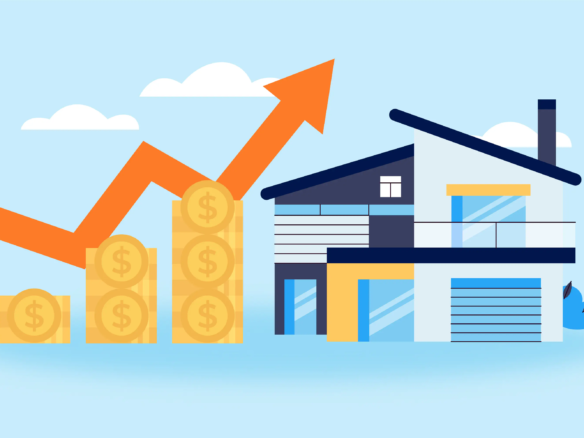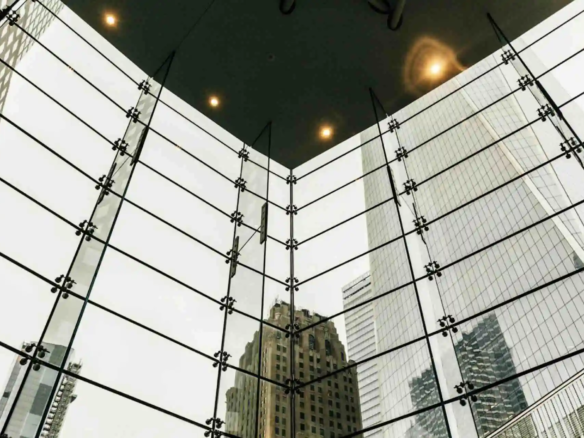Dubai’s real estate market has long fascinated investors and industry observers alike. Over the past few years, it has experienced remarkable growth, driven by an influx of expatriates, large-scale development projects, and an economy supported by strategic government policies.
Residential property prices have risen nearly 40%, with rental yields soaring, particularly in the luxury and business-class segments. These trends have solidified Dubai as one of the most attractive real estate destinations globally, offering tax-free rental income and high returns on investment.
Will Dubai’s real estate boom persist, or are we heading toward a correction? This article delves into the factors shaping the market, exploring key trends, potential risks, and the outlook for investors navigating this dynamic landscape
What is a Real Estate Bubble?
Before we delve into whether Dubai is in a bubble, let’s clarify what a real estate bubble is. A property market bubble occurs when real estate prices surge rapidly due to high demand, speculation, or other factors, pushing them far beyond their intrinsic value. While this creates a short-term boom, these inflated prices are often unsustainable. When market conditions shift, such as a decrease in demand or tightening credit, the bubble bursts, leading to sharp price corrections or crashes.
How can you identify a real estate bubble? Here are some common indicators:
- Rapid Price Appreciation: Prices rise unusually fast, often outpacing wage growth and economic fundamentals.
- Speculative Buying: Investors purchase properties not for use or long-term holding but with the intent of flipping them quickly for profit.
- Overleveraged Buyers: Many buyers rely on excessive debt or risky financing options to afford properties, increasing their vulnerability to economic downturns.
- Oversupply: A significant increase in construction leads to more properties being available than the market can absorb, contributing to downward pressure on prices once demand slows.
Understanding All Concerns Regarding Dubai Real Estate
Concern 1: Real Estate Prices Are Skyrocketing in Dubai – Is It Sustainable?
Dubai’s real estate market has experienced remarkable price growth, driven by high demand, limited supply, and substantial international investor interest. Notably, prime areas like Palm Jumeirah and Downtown Dubai continue to attract affluent buyers, leading to further price escalation. Property prices in Dubai rose over 12% in 2024 alone, with July 2024 property sales reaching AED 49.6 billion ($13.5 billion), reflecting a 31.63% year-on-year increase. This growth is underpinned by Dubai’s expanding economy, growing population, and increasing foreign investments.
While the rising prices have sparked concerns about sustainability—especially among middle-class residents struggling with affordability due to inflation and rising interest rates—the fundamentals appear strong. Dubai’s strategic positioning as a global tourism, business, and investment hub plays a significant role in maintaining demand. Its unique tax benefits, high rental yields, and a safe investment environment continue to attract international investors.
Additionally, compared to other global cities like London, New York, or Hong Kong, Dubai remains competitively priced, making it an appealing destination for luxury buyers. The government’s strategic policies aim to control supply and stabilize the market, ensuring that the growth is not solely speculative. This positions Dubai as a promising destination for both luxury and business investment, grounded in robust economic appeal rather than unsound fundamentals.
Concern 2: Market Driven by Speculators – A Classic Bubble Indicator?
Speculative buying has long been a hallmark of Dubai’s real estate cycles. In recent years, off-plan properties have accounted for 58% of all transactions, a significant trend reflecting buyers’ expectations to profit from price appreciation before project completion. This speculative behaviour is often viewed as a red flag, potentially signalling a bubble.
However, Dubai’s government has taken proactive steps to mitigate these risks. Regulatory measures such as stricter mortgage caps, higher down payment requirements, and enhanced transparency in property transactions aim to curb excessive speculation. Additionally, initiatives like long-term visas and off-plan payment regulations encourage more sustainable, long-term investment behaviours.
Adding to the argument against a speculative bubble, Dubai ranks low on global bubble risk metrics. According to the UBS Global Real Estate Bubble Index (2023), Dubai’s index score is just 0.14—classified as fair-valued—far below cities like Zurich (1.71) and Tokyo (1.65), which fall into the bubble-risk category. The table below highlights how Dubai compares to other major real estate markets globally:
| City | Index Score | Category |
| Zurich | 1.71 | Bubble risk |
| Tokyo | 1.65 | Bubble risk |
| Miami | 1.38 | Overvalued |
| Hong Kong | 1.24 | Overvalued |
| Toronto | 1.21 | Overvalued |
| Los Angeles | 1.03 | Overvalued |
| Amsterdam | 0.80 | Overvalued |
| Milan | 0.49 | Fair-valued |
| New York | 0.47 | Fair-valued |
| Singapore | 0.47 | Fair-valued |
| San Francisco | 0.27 | Fair-valued |
| Dubai | 0.14 | Fair-valued |
The primary reason for Dubai’s low bubble risk score lies in its diverse investor base and market controls. Post-2020 reforms have reduced the speculative influx, encouraging end-users and long-term investors to seek rental income over quick profits. Today, many buyers in Dubai’s market are individuals looking for stable returns rather than speculative gains, signalling a healthier and more sustainable market.
Concern 3: Saturation of Luxury Properties – How Much More Can It Take?
Dubai’s real estate market is often criticized for its perceived over-reliance on luxury developments, from high-end beachfront villas to opulent penthouses. Critics argue that an oversupply of such properties could destabilize the market, leading to price corrections. However, the reality paints a more nuanced picture.
Luxury properties in Dubai are increasingly viewed as a global asset class. According to a recent Knight Frank report, international high-net-worth individuals (HNWIs) allocated $4.4 billion for investments in Dubai’s residential market in 2024—a 76% increase from 2023. These buyers, hailing from Europe, Asia, and Africa, see Dubai as a haven for investment, driven by its favourable tax policies, strategic location, and world-class amenities. Wealthy investors regard these luxury homes not only as residences but also as secure stores of value that yield high returns over time.
Despite the growth in the luxury segment, data from CBRE (Coldwell Banker Richard Ellis) reveals a shift toward the mid-tier and affordable property segments. Transactions in the AED 1,000 to AED 2,000 per square foot range increased by 64.1%, while activity in the AED 2,000 to AED 3,000 per square foot bracket soared by an impressive 154%. These trends suggest a broadening of the market, with increased interest in more affordable housing options, which helps balance the overall market dynamics.
The ultra-luxury market, however, has seen a decline in activity, largely due to limited stock availability. Properties priced between AED 3,000 and AED 8,000 per square foot experienced a 19.5% drop in transactions. Meanwhile, homes exceeding AED 8,000 per square foot accounted for just 0.2% of total transactions in May 2024, according to CBRE. This indicates that, while demand for ultra-luxury properties remains strong, supply constraints are curbing growth in this segment.
Dubai’s real estate market is far from oversaturated with luxury properties. Instead, it’s characterized by a growing demand across various price points. The rise in mid-tier property transactions demonstrates the city’s appeal to a broader demographic, while the steady demand for high-end homes underscores its attractiveness to global elites. The diversity in demand helps stabilize the market, reducing the risk of an over-reliance on luxury properties or a speculative bubble.
Concern 4: Can Dubai’s Economy Support the Booming Real Estate Market?
Dubai’s economy has evolved significantly, moving beyond its traditional reliance on oil. Key sectors like trade, tourism, real estate, and technology now play substantial roles in the emirate’s GDP (Gross Domestic Product), supported by visionary policies such as the Dubai Economic Agenda D33. These initiatives aim to double Dubai’s economy over the next decade, emphasizing sustainable growth and strategic diversification.
Economic Contributions and Growth
The following provides an updated breakdown of economic contributions by sector and their performance in 2023:
| Sector | Contribution to GDP (%) | GDP Value (AED) | Growth Rate (%) |
| Tourism & Hospitality | 11% | 111.3 billion | 11.1% |
| Trade | 28% | 283.6 billion | 6% |
| Real Estate | 7% | 70.9 billion | 4% |
| Oil & Gas | 29% | 293.5 billion | 2% |
| Technology & Startups | 9% | 91.0 billion | 4.4% |
| Transportation & Logistics | 13.1% | 133 billion | 10.9% |
The non-oil sector’s growth is notable, with a 7.3% year-on-year increase in 2023, highlighting Dubai’s resilience and capacity for economic expansion. Sectors like transportation and logistics (10.9% growth) and tourism (11.1% growth) have outpaced others, showcasing the benefits of strategic investment in infrastructure and innovation. Real estate, while smaller in contribution, continues to attract significant global interest, with a 37% year-on-year increase in transaction value, signalling investor confidence.
Dubai’s diversified economy is a key strength, making it less vulnerable to oil price fluctuations. However, risks remain. The emirate’s reliance on foreign investments and speculative buying, particularly in the real estate sector, could pose challenges during global economic downturns. For instance, global liquidity tightening or geopolitical tensions could impact Dubai’s ability to attract and sustain high levels of international investment.
Efforts to mitigate such vulnerabilities include prioritizing sustainable policies, fostering public-private partnerships, and enhancing the business environment for innovation and enterprise. The Dubai government’s long-term focus on creating an attractive investment climate, coupled with real-time data-driven economic monitoring, reinforces its ability to adapt to shifting dynamics.
By continuing to focus on its non-oil sectors and strategically diversifying its economic activities, Dubai is positioning itself as a resilient global hub. However, potential investors should stay informed about macroeconomic risks to navigate the market effectively.
Bubble Myth: Why Dubai’s Market Is Different This Time
The notion of Dubai’s real estate market being in a bubble often stems from comparisons to the 2008 boom-and-bust cycle. However, today’s market operates under vastly improved dynamics, with strong fundamentals ensuring a more sustainable growth trajectory. Here’s why Dubai is different this time:
1. Foreign Investment
Dubai remains a global investment hotspot, attracting international buyers due to its tax-free environment, high rental yields, and transparent regulatory framework. Unlike speculative investors of the past, today’s buyers often include high-net-worth individuals (HNWIs) and expatriates seeking second homes or long-term investments. Global interest has surged, evidenced by Dubai’s position as one of the most appealing real estate destinations for international investors.
2. Economic Diversification
Dubai’s shift away from an oil-dependent economy has strengthened its resilience against global economic fluctuations. Sectors like finance, tourism, technology, and trade are thriving, contributing to consistent demand for real estate. The emirate’s growing reputation as a global financial and innovation hub reinforces its economic stability, with these diversified industries acting as pillars to support long-term growth.
3. Ease of Doing Business
Dubai ranks first in the region and 14th globally on the Innovation Cities Index, solidifying its reputation as a business-friendly environment. The city’s extensive free zones, robust venture capital ecosystem, and streamlined visa and tax policies make it highly attractive for businesses and individuals alike. Notably, it ranks third among the wealthiest BRICS (Brazil, Russia, India, China, South Africa) cities, making it an economic powerhouse with diverse opportunities across industries.
4. Sustainable Demand
The city’s population growth, coupled with the steady influx of expatriates, HNWIs, and tourists, creates ongoing demand for property. Government initiatives, such as long-term visas for property owners and the Golden Visa program, have attracted global investors seeking stable, long-term opportunities. This sustained demand differentiates Dubai’s market from the speculative-driven cycles of the past.
5. Robust Government Regulations
To ensure market stability, the Dubai government has introduced stringent policies to curb reckless speculation. These include higher down payment requirements, taxes on short-term property flipping, and payment plans tied to project milestones. These measures prevent speculative bubbles and promote responsible investment, creating a balanced and sustainable market environment.
In summary, Dubai’s current real estate market is supported by economic diversification, foreign investment, sustainable demand, and prudent government policies, making it significantly more robust and less prone to speculative bubbles compared to previous cycles. While no market is immune to external shocks, Dubai has positioned itself as a global leader in real estate stability and resilience.
Key Strengths of Dubai’s Real Estate Market
Dubai’s real estate market stands out as a unique and highly attractive opportunity for investors worldwide. Here are the main reasons why it continues to be a top choice for both new and seasoned investors:
1. High Rental Yields
Dubai consistently offers some of the most competitive rental yields globally, averaging 7-8%, far surpassing yields in cities like London or New York. In the first half of 2024, rental growth was notable across all segments:
- Affordable Apartments: Rentals increased by 4% to 31%, with studio flats in Al Nahda experiencing the highest rise.
- Mid-Tier Apartments: Rents climbed by 15%.
- Luxury Apartments: Prices rose by up to 7%.
- Budget Villas: Rentals increased by 12%.
- Mid-Tier Villas: Up by 15%.
- Luxury Villas: Soared by 27%.
This strong performance highlights Dubai as a top destination for investors seeking reliable, high cash-flow opportunities.
2. No Property Taxes
Dubai’s tax-free environment is a significant draw for property investors. Unlike other global cities where property taxes can eat into profits, Dubai offers a higher return on investment by eliminating this financial burden. This feature particularly appeals to long-term investors seeking to maximize profitability.
3. Pro-Growth Policies
The UAE (United Arab Emirates) government actively fosters economic and investment growth through progressive policies. Programs like the Golden Visa, granting long-term residency to property investors, demonstrate the city’s dedication to attracting international capital. Such initiatives ensure sustained foreign interest and enhance investor confidence.
4. A Global Safe Haven
Dubai has cemented its reputation as a secure, business-friendly, and politically stable environment, making it a reliable choice for capital preservation during uncertain times. In a 2024 ranking by Khaleej Times, Dubai secured third place among the top 10 global cities, surpassing notable hubs like New York, London, and Tokyo. Its strategic position as a global hub for business, tourism, and trade adds to its appeal to international investors.
5. World-Class Infrastructure and Development
Dubai’s infrastructure continues to evolve with ambitious projects like Expo City and the Dubai Master Plan 2040. These developments aim to enhance livability, attract businesses, and draw global talent, thereby fueling long-term property demand. Dubai’s exceptional connectivity, modern amenities, and visionary urban planning make it a standout city for investment.
So, Is Dubai’s Real Estate in a Bubble?
After examining the various factors influencing Dubai’s real estate market—government policies, market fundamentals, buyer behaviour, and global economic trends—it’s clear that Dubai’s real estate sector is not in a bubble. Unlike the speculative-driven boom and bust of 2008, the current growth is supported by strong economic fundamentals, diverse and sustained demand, and robust government oversight.
While any market experiences cycles of correction, the long-term outlook for Dubai remains positive. The city is not simply riding a temporary wave of demand; it is steadily evolving into one of the world’s most sought-after investment destinations. As an investor, it is crucial to focus on the long-term fundamentals, stay informed, and not be swayed by short-term fluctuations.
Here are some strategic tips to help you navigate the market:
- Diversify Your Portfolio: Explore different property segments such as residential, commercial, and even emerging areas like short-term rentals. This diversification helps mitigate risk and protects you against sector-specific downturns.
- Leverage High Rental Yields: Take advantage of Dubai’s exceptional rental yields, which continue to outperform many global cities. If you’re a buy-to-let investor, target high-demand areas where rental income can provide a cushion against market corrections.
- Stay Informed: Keep an eye on both local government policies and global economic trends. Dubai’s real estate market is closely connected to international factors, and staying updated on these shifts will help you make well-informed decisions.
- Consider Off-Plan Properties: Off-plan investments can offer lower initial costs and flexible payment plans. However, always invest with reputable developers, and ensure you understand the project’s timeline and delivery schedule.
Conclusion: What Should You Do as an Investor?
If you’re considering investing in Dubai’s real estate market, it’s essential to approach it with a long-term view. The market is grounded in solid fundamentals, and governmental measures are in place to ensure sustained growth. While rising prices and demand may be present, they are underpinned by real economic activity, not speculative frenzy. While no market is entirely free of risk, Dubai is far from the volatility that characterizes a speculative bubble.





